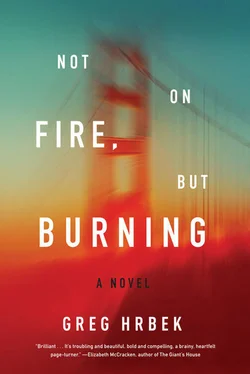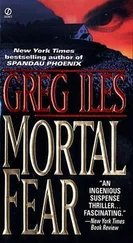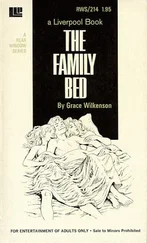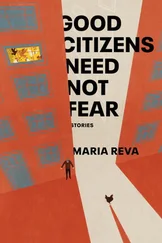By the next day, the insects have changed once again. The eyes are still red but the body has gone from white to black; the veins on the wings from pale yellow to brown. And the males have found their voices. The world is full of the noise: a dizzy trilling that gets trapped like a greenhouse gas below the dome of the sky and echoes as endlessly as surf in the helixes of a conch shell. Dorian and his friends are outdoors, playing a kind of game. Each boy has captured a fully matured cicada and pinned it, alive, to one of the four corners of a cork board. Each of them has a magnifying glass from a science kit and is using it to concentrate the energy of the sun into a single point on his insect. Whoever’s catches fire first wins. But the whole thing is a bust: All that happens is, they burn a smoking hole through the poor things. The lack of a dramatic conflagration leaves an emptiness where there might have been a thrill; and other feelings, annoyance and pity, for example, claim the hollow space. The dizzy echoing noise, the chorusing, which comes not from screaming mouths but from vibrating abdominal membranes, seems to get louder.
“Whose bright fuckin idea was this?”
“Keenan.”
“Brilliant, dude.”
“We did prove something,” Dean points out. “They’re not flammable.”
“Idiot,” Keenan says.
“What.”
“It’s just not enough heat is all. Phase two, we need a medicine dropper. Everybody gets two drops of lighter fluid …”
This is when the car comes up the curve of the road. Mr. Banfelder’s Argo Electric, which has not been sighted for a week. He sees the boys and gives two friendly taps on the horn. There’s someone in the backseat.
A kid.
They all see him. And the window is down, so they see him pretty well. They see shaggy black hair squalling in the slipstream. Skin that isn’t black or white, but an unmistakable in-between brown.
“It’s a haji,” Keenan says.
“Jeezuss.”
“Am I right?”
“You’re right,” Dean says.
“Zeb?”
“I didn’t really see him.”
“Dorian?”
But Dorian doesn’t answer. He watches the car follow the curve of the cul-de-sac and pull into the driveway of the house with maroon shutters and the old lawn jockey statuette on the grass. Car stops. Passengers disembark. It’s a kid, all right. A boy. Judging from his size relative to that of the car: eleven, twelve years old. He’s looking up at the air, at the trees. ( That sound .) Then he crouches down and picks something off the blacktop of the driveway. Holds it in front of his eyes. ( What the fuck is this? ) … As a finger whistle whipcracks across the subdivision.
“He wants us.”
“Us?”
“To go over there,” Dean says.
Dorian sets his magnifying glass down on the corkboard where the four insects lay impaled and scorched, and starts walking toward the Banfelder house. One at a time, his friends fall in behind him.
Will has been anxious about this moment ever since committing to the adoption. He knows these boys well. He’s known them for years. The Wakefield boy in particular. All good kids. Except for the one who dressed up like a Jew from the Holocaust last Halloween. Actually shaved his head. Keenan. But other than him, they are as good as you can expect. Still, is it too much to ask of them? To befriend a Muslim. No, not that. Just accept him. Understand him and let him be.
“Karim.”
The kid doesn’t respond or move. He’s in a crouch, holding a cicada by the wing, though not looking at the insect. Watching the posse approach. Four kids: three white, one black. Will says, in Arabic:
“Stand up, Karim. And give a proper greeting.”
For the first time, Will has spoken to him in what you could call a fatherly tone of voice. And the kid obeys. Though first he looks up — with eyes to make an old man think of a past that won’t let go. (Like a time we were at one of the old palaces, where we weren’t supposed to be, but in the early days everyone was: We’d ride into these fallen citadels in our up-armored sport-utility vehicles, firing in the air like Yosemite Sam and any towelhead who didn’t put his hairy face in the dirt wasn’t alive for evening prayers, which is how it went on this one day in Samara or Babylon or Tikrit, who can remember anymore, all incidents and settings seem interchangeable now, but wherever it was, there was a haji in a dishdasha with a camel; and even when the team leader, an ex-Marine named Brainard, walked directly toward them with the sawed-off Winchester 1887 he’d brought from Toad Suck, Arkansas, herder and animal just stood there, staring us down. It was not surprising when Brainard put the muzzle of the shotgun to the patella of the camel’s left foreleg. Shot. All at once, the lower half of the leg was dangling from a bloody cord of muscle and fur. The guy came next. Same place. In the kneecap. Brainard ejected the spent shells and started toward the palace; and as usual, because the suffering didn’t seem to unduly concern anyone else on the team, you were the one to clean up the mess and put each thing out of its misery. The man didn’t bother you so much, the way he swore and spat at you. But the animal. Which had stood for a few moments on three legs before collapsing suddenly onto the road. Kneeling beside it, you thought: Odd animal. The hump and the two-toed hoof. As you knelt beside it, the head on the long neck craned strangely. Eyes searching, for what?) Back then, what Will Banfelder did was: He stroked the smooth fur of the head, once, twice, then pressed a gun to the top of the skull. What he does now is: Puts an arm around his new son’s shoulders (think son , use the word in your mind), and says, “It’s all right. You’re going to like them.”
The boys have a superstition with the lawn jockey. Every time they cross to the Banfelder property, they slap him five. He’s one of the old ones with skin painted the color of a charcoal briquette and big red lips. The Negro, they call him. To slap The Negro five is cool. To not do so is to dis The Negro. Dorian walks right by the statue and Plaxico says: “Bro, you dissed The Negro.” He doesn’t give a shit. His mind is otherwise engaged by the idea of walking right up to this kid and clocking him without saying a word. The feeling is terrible. He knows nothing about him yet. Nonetheless, Dorian’s body is cramping with anger. Hating … not him exactly, but the idea of him, or the idea of people like him — and though he has been taught to not believe in the sameness of all such persons, a logic as inborn as the structure of his DNA connects each and every one of them …
Mr. B says: “Whazzup, boyz?”
“Hey.”
“Someone I’d like you to meet. This is Karim. Karim, this is Dean, Plaxico — I mean, Zebedee — Keenan, and Dorian.”
“What does that mean?” Keenan asks.
“It’s called an introduction, pal.”
“No, that.” He points to the rear of the Argo Electric. The bumper sticker says: WHERE THE HECK IS WALL DRUG.
“Wall Drug,” Dean says. “Must be a hash bar.”
“Good guess. But no. It’s a tourist trap in the Dakota Territory.”
“Dakota,” Dorian says.
“Which is where we just came from.”
Dorian looks at the kid and speaks to him directly: “That’s where you live …”
“Sort of,” Karim says.
“ Used to live,” Mr. B specifies.
“Used to.”
“Where does he live now?” Keenan asks.
“You’re lookin at it. Thirteen Poospatuck Circle. Christ, it’s hot out here. And these bugs, it’s a like a goddamn Bible plague.”
“I don’t get it,” Keenan says.
Читать дальше












